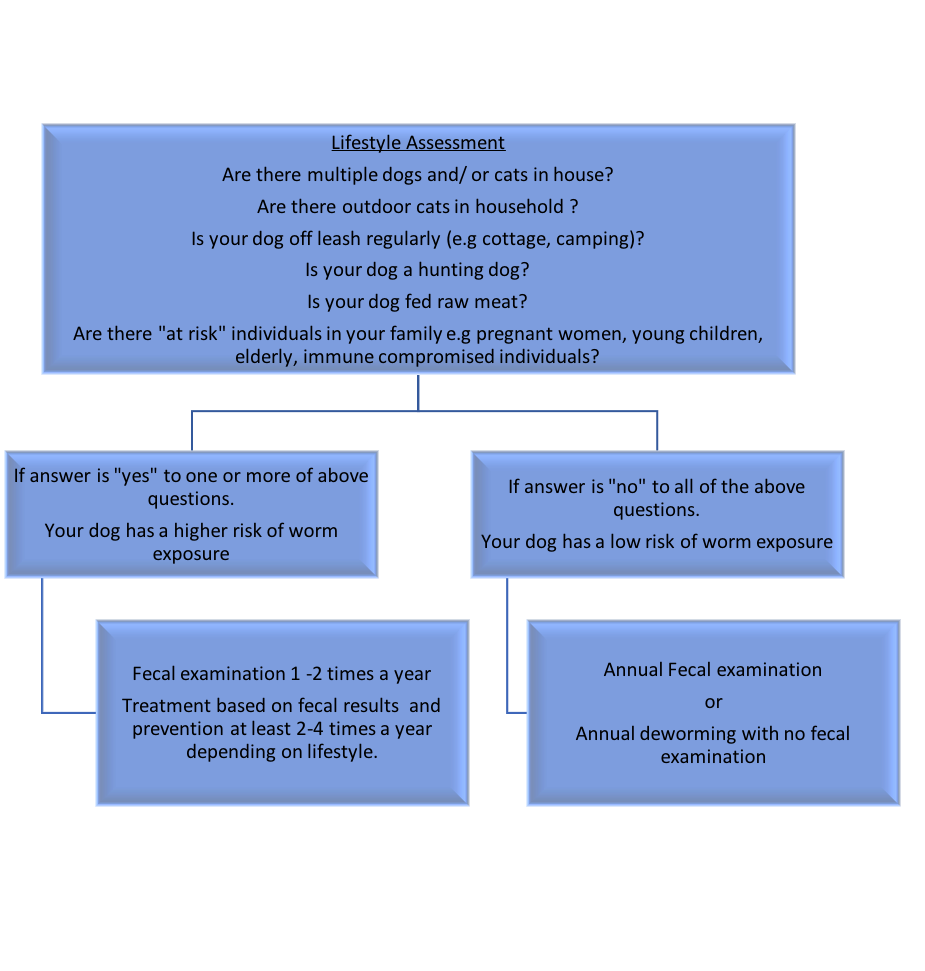THE NEWLY FAMOUS TAPEWORM.
Recently, the tapeworm, Echinococcus multilocularis has taken the media by a storm. Here is what you need to know about this famous worm and how to protect your family.
The basics:
- Echinococcus multilocularis, a small tapeworm normally found in the intestinal tract of wild canids (e.g. coyotes, foxes) and sometimes dogs. This tapeworm is found in 1 in 4 coyotes and foxes in Southern Ontario.
- Dogs that eat rodents or that often come into contact with the feces of wild canids (such as coyotes) are at risk of picking up the tapeworm. Infected dogs can shed eggs in their feces that could infect people.
- The main concern (and the reason for its newfound fame) is when something (or someone) ingests tapeworm eggs that are passed in feces of canids (coyotes, foxes, dogs). This can result in a condition called alveolar echinococcosis (AE), in which tumour-like parasitic cysts can develop in other parts of the body, particularly in the liver.
- Human cases in Canada are rare but are being found and may be under diagnosed. However because the potential disease is a very nasty disease, and very difficult to treat, public health professionals are inherently cautious.
What can you do to protect your family?
If your dog is always on leash and has no exposure to wildlife - your dog has minimal exposure. Practice good hygiene. Wash your hands. Pick up after your dog (and wash your hands after).
Dog owners with at risk dogs (dogs that are off leash or hunting dogs) should take precautions by washing hands after handling poop or after petting their fur, particularly near their rear ends where the eggs are shed. You can also greatly reduce your risk by not letting your dog into your bed because you can come into contact with eggs shed onto the bed.
There are two main approaches to prevention: decreasing the risk of exposure and prophylactic deworming. Ultimately, whether or not to treat a dog prophylactically is a case-by-case decision.
For more information visit
https://news.uoguelph.ca/2019/04/potentially-dangerous-tapeworm-more-widespread-in-ontario-than-thought-u-of-g-research-finds/
https://www.wormsandgermsblog.com/2019/04/articles/animals/dogs/echinococcus-multilocularis-back-in-the-news/?fbclid=IwAR0Wie4PkjxTZBO9rt7dXTp9ri1tuyezFUH-eIWw1ybMMHD1WrJS9E-d3ZU
Our Pet Health Plans include annual fecal exams and deworming treatment.
At Mac Animal Clinic we recommend annual Fecal Anitgen Testing which detects a substance (antigen) secreted by the worms in the faeces which allows for earlier detection of infection.
The frequency of deworming depends on each individual pet's lifestyle and exposure risk. The following flow chart provides a guide to assess your pet's risk profile. If you have further questions or concerns do not hesitate contact us at
reception@macvets.com

Leave a Reply.
SIGN UP TODAY!
We will get back to you as soon as possible.
Please try again later.


Street Address : 1026 Speers Road
City : Oakville
State / Province : Ontario
Postal / Zip Code : L6L 2X4
HOURS
Monday: 9:00 am - 6:00 pm
Tuesday: 9:00 am - 6:00 pm
Wednesday: 9:00 am - 7:00 pm
Thursday: 9:00 am - 5:00 pm
Friday: 9:00 am - 5:00 pm
Saturday: Closed
Sunday: Closed
SERVICES
© Copyright 2024 - All Rights Reserved - Mac Animal Clinic | Cancellation Policy | MyPortal™


